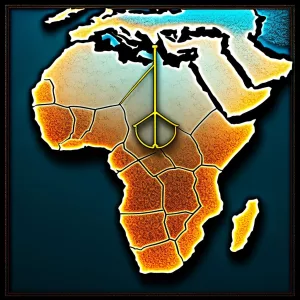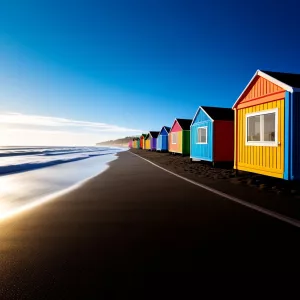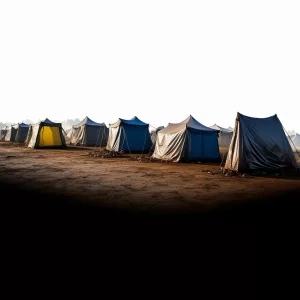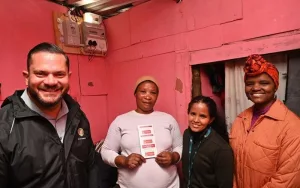Minister Mmamoloko Kubayi envisions a future for South Africa’s National Prosecuting Authority (NPA) built on honesty, technology, and care for victims. She calls for stronger teamwork, fighting new types of crime, and giving women equal chances within the system. Kubayi wants the NPA to be a place where talented people grow, where justice moves faster, and where victims are treated with kindness and respect. Her vision is bold: a justice system that is fair, modern, and ready to face tomorrow’s challenges.
Deputy Minister Alvin Botes spoke passionately about the urgent need to protect innocent lives through International Humanitarian Law (IHL) in Africa’s many ongoing conflicts. He reminded leaders that these laws are not just words on paper but vital shields for civilians and aid workers caught in war. Africa stands at a critical moment to lead the world in upholding justice, compassion, and shared humanity amid new and complex threats. Botes called for unity and strong action so that the protection of human dignity becomes a global, unshakable commitment.
Minister Mmamoloko Kubayi spoke passionately at the Vaal University of Technology about the ongoing fight for gender equality in South Africa. She highlighted both the progress made, like more women in government and courts, and the big challenges still faced, such as unfair jobs, cultural barriers, and high unemployment for Black women. Kubayi reminded everyone that real change needs teamwork and sharing success so no one is left behind. Her message was clear: together, South African women can break old rules and build a fairer future for all.
South Africa’s Parliament plays a big role in protecting social rights like healthcare, education, and gender equality. It watches over the government to make sure these services are fair and reach everyone, including vulnerable groups and migrants. Through open talks and tough laws, Parliament works hard to fix old problems and build trust with the people. Leaders from different committees share their stories and plans to keep South Africa moving toward a future where everyone is treated with respect and fairness.
Muizenberg’s Eastern Beachfront is coming alive again with fresh upgrades like better parking, safer walkways, and beautiful native plants. The new seawalls help protect the beach from rising seas and storms, making it stronger for the future. This makeover welcomes everyone families, surfers, and local shops bringing back the lively spirit that makes Muizenberg special. It’s more than just a fix; it’s a hopeful new beginning for a beloved seaside spot where nature, history, and community connect.
South African journalists gathered in Cape Town to protest the killing of over 190 media workers in Gaza since October 2023. They stood together to defend press freedom and demand justice for those targeted simply for reporting the truth. Drawing on South Africa’s history of fighting oppression, the protest called out unethical media practices and showed deep solidarity with Palestinian journalists facing violence. Their voices rose by the sea, a powerful reminder that telling the truth is never a crime, even in the darkest times.
In South African prisons, inmates run bakeries that bake thousands of affordable loaves each day, saving millions of rand and changing prison life. This handson work teaches baking skills, builds confidence, and gives prisoners a sense of hope and purpose. Instead of just punishment, these bakeries help turn prisons into places of growth and new chances. Each loaf is more than bread it’s a symbol of renewal and a brighter future.
South Africa is trapped in a driver’s licence nightmare caused by an old, breaking machine that prints the cards too slowly. Every day, thousands of drivers wait in long, twisting lines, stuck and frustrated as their expired licences hold up their lives. Efforts to fix the problem have stumbled over costly mistakes and slow bureaucracy, leaving over half a million people caught in limbo. This crisis shows how broken systems can deeply affect ordinary lives, yet amid the chaos, South Africans keep finding ways to cope and hope for change.
Life in Paint City refugee camp is tough and full of challenges like cold weather, crowded tents, and little clean water. Yet, families like Francine’s stay strong, sharing what they have and hoping for a safer future. Though the camp feels like a prison at times, it also becomes a small village where people create new bonds and ways to live despite hardship. Even with fears of eviction and danger outside, the residents hold onto hope that one day they will find a permanent home.
Residential fire prevention has made homes safer by cutting fire cases by 10% and deaths by 25%, thanks to strong community education, smoke alarms, and emergency planning. People across neighborhoods learn how to escape fires and keep their families safe, but some areas with poor housing still face big risks. Firefighters work hard with new tools and training, yet dangers like nighttime fires linked to alcohol and attacks on crews remind us the fight isn’t over. Fire safety is a shared effort, needing everyone’s care and constant readiness to protect lives.
Water Supply Interruptions in Cape Town: Understanding the August 2025 Maintenance Plan
In August 2025, Cape Town will pause water supply in several neighborhoods from the 18th to 21st to fix and test pipelines. Residents are asked to store water and expect short outages, but water tankers will be available nearby. These upgrades help keep the city’s water safe, reliable, and ready for the future. Though the interruptions may cause some hassle, they show Cape Town’s care for this precious resource and the people who depend on it.
TotalEnergies, South Africa, and the Power of Public Participation: Lessons from a Landmark Ruling
In early 2024, South Africa’s Western Cape High Court made a powerful decision to cancel TotalEnergies’ permit for offshore oil and gas exploration because the company failed to properly involve local communities and assess environmental risks. This ruling was a big win for coastal residents and environmental groups, showing that people’s voices matter when it comes to protecting nature and livelihoods. It also sent a clear message to energy companies: they must be honest, open, and careful about the risks if they want to operate near South Africa’s shores. This case is now a strong example of how public participation can shape a country’s energy future and defend the environment.
BoVine Wine and Grill House is a special place in Cape Town where great food meets local charm. With two beautiful spots one by the sunny beach in Camps Bay and another in a historic City Centre building it offers a warm, friendly vibe alongside delicious dishes like the famous Fiorentina steak. The team treats every guest like family, serving up meals paired with fine Cape Winelands wines. Whether watching a sunset or enjoying a lively city night, BoVine promises a cozy, memorable experience full of heart and flavor.
Madame Zingara is a magical, lively show and dining experience in Cape Town, held inside a beautiful old mirrored tent. It mixes circus, cabaret, and bold food to create a night full of surprises, music, and wonder where guests become part of the fun. More than just a restaurant, it brings people together to share joy and stories under sparkling mirrors. After a pause, Madame Zingara is returning, ready to light up Cape Town nights once again with its wild, playful spirit. It’s a place where fantasy and reality dance together, inviting everyone to dream big and celebrate life.
Dontse Yakhe, a small, lively settlement near Cape Town, has long lived in the dark, relying on dangerous candles and open flames. In 2025, 170 homes finally got connected to safe and steady electricity, changing life for the better. Now, children can study under bright lights, families keep food fresh, and local businesses grow. This simple glow brings hope, safety, and pride to a community that never gave up. It’s more than just power it’s a spark of new life and promise.
Starting September 2, 2025, South Africa’s SASSA OldAge Grants will arrive earlier and offer more ways for seniors to collect their money, easing their monthly worries. The government has raised the income and asset limits, so more older people can qualify, while also tightening rules to stop fraud and wrongful deductions. These changes help ensure seniors get their support on time, with fairness and protection, making life a bit easier and more secure for those who have given so much.
















